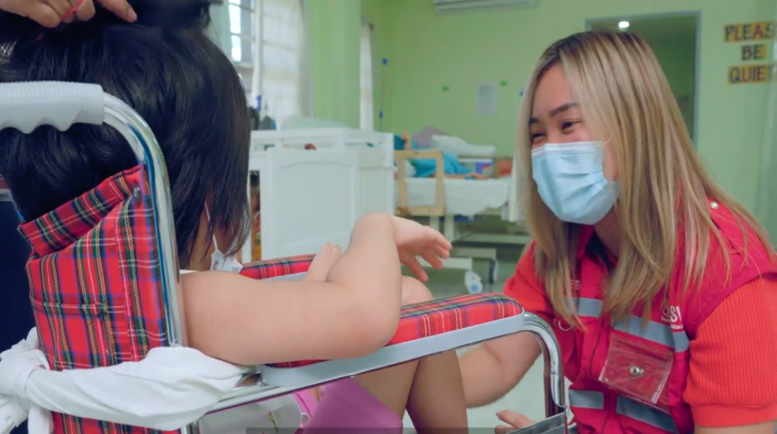ANGELS’ HAVEN
 The Angels’ Haven is a
government welfare institution in the Philippines under the Department of Social Welfare and Development that exists with a mandate to
provide residential intervention
to children with special needs who were abandoned, neglected, surrendered and/or voluntarily
committed to the care of the
state. This institution is located at Riverbank Ayala, Apokon, Tagum City, Davao del Norte, Mindanao, Philippines. Angels’ Haven started its operation last June
30, 2021. The Center caters
to bedridden and semi-ambulatory children with varying degrees of disabilities. This facility has a
capacity of 20 residents for the
time being. The
acquisition of the accretion lot where the Center now is located started after the first construction at
the original location in Bago Oshiro, Davao City was
halted due to the intervention from the Department of Public Works and Highways. It was in the
direct path of
a major road project to be implemented by the DPWH Central Office. Fortunately, the City
Government of Tagum offered an alternative location for children of Angels’
Haven who have special
needs.
The Angels’ Haven is a
government welfare institution in the Philippines under the Department of Social Welfare and Development that exists with a mandate to
provide residential intervention
to children with special needs who were abandoned, neglected, surrendered and/or voluntarily
committed to the care of the
state. This institution is located at Riverbank Ayala, Apokon, Tagum City, Davao del Norte, Mindanao, Philippines. Angels’ Haven started its operation last June
30, 2021. The Center caters
to bedridden and semi-ambulatory children with varying degrees of disabilities. This facility has a
capacity of 20 residents for the
time being. The
acquisition of the accretion lot where the Center now is located started after the first construction at
the original location in Bago Oshiro, Davao City was
halted due to the intervention from the Department of Public Works and Highways. It was in the
direct path of
a major road project to be implemented by the DPWH Central Office. Fortunately, the City
Government of Tagum offered an alternative location for children of Angels’
Haven who have special
needs.
OBJECTIVES
·
To provide Children with Special Needs with
love, care, protection in a happy, therapeutic and non-rejecting atmosphere
through residential
child care and to promote an accessible home-like
environment;
·
To assist Children with Special Needs in
gaining independence for daily
living in a sheltered environment;
·
To provide safe environment and protection from
harm;
·
To provide opportunities for the Children with
Special Needs to acquire
motor and occupational skills according to their level of intelligence and improve their capacities;
·
To refer Children with Special Needs for
alterative parental care through
adoption and foster care.
TARGET CLIENTELE
The Center shall serve those children with intellectual disabilities and neurodevelopmental disorders covering the
following case categories:
Abandoned: A child who has no proper parental care, guardianship or whose parents have deserted
him/her for a period
of at least three (3) continuous months, which includes foundling.
Neglected: A child whose basic needs have been deliberately unattended to or inadequately attended to,
physically or emotionally,
by his/her parents or guardian within a period of three consecutive months. There is a physical neglect when
the child is malnourished, ill-clad and without
proper shelter. A child is
unattended when left by him/her without proper provision’s and or without proper supervision.
Foundling: A child whose facts of birth are unknown.
Voluntary Committed or
Surrendered: A child whose parents or legal guardian knowingly and willingly
relinquished parental authority
to the DSWD or any duly accredited child-placement or child caring agency or facility. This refers to
a child who has been
surrendered in writing by his/her parent’s or guardian through a notarized Deed of Voluntary
Commitment
PROGRAMS AND SERVICES
Social Service
Handles
Case Management as a delivery system that organizes, coordinates and sustains a network of formal
and informal
support Services and activities designed to optimize the functioning
and well-being of children with multiple needs.
Homelife and
Dietary Services
Provides
for the basic needs of the residents such as food, clothing and shelter, with a
well-balanced and organized activities to meet their physical, emotional,
mental and
social needs.
Health Services
Provides
complete physical and dental examination to each resident upon admission and as required based on
the health needs. It shall likewise make referral for treatment
of illness, other special medical needs, laboratory examination
and other medical services which are according to the
advice/prescription of licensed and medical professional.
Physical and Occupational Therapy Services
Develops
the necessary
management for residents with fracture, muscular trauma,
and assists them on the proper use of devices so they can gain use
of these physical functions and prevent deformities. Designs
and implements treatment programs for the development, improvement
and maintenance of sensory, perceptual, social, and cognitive
skills; aids in maintaining and improving the range of motion
and muscle strength; fabricates adaptive equipment and trains
residents on its proper use.
[put_wpgm id=15]

